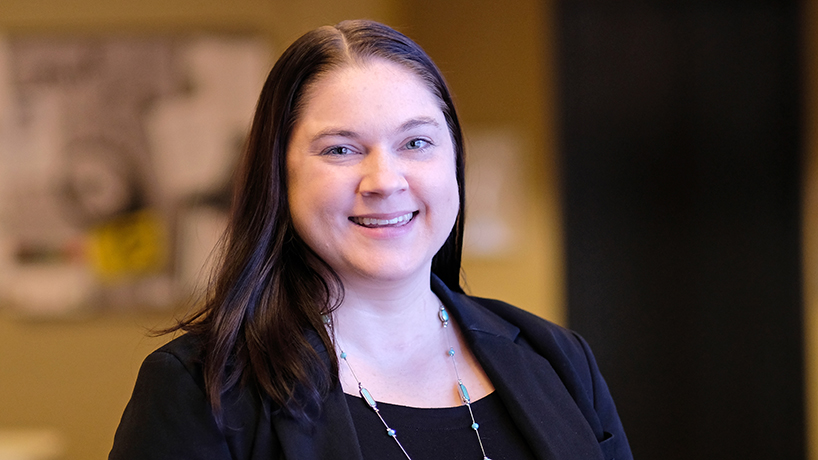
Anne Thatcher graduated last August not only with her DNP but also with a desire to have a large-scale impact on behavioral health in the United States. (Photo by August Jennewein)
Some might go as far as to say that Anne Thatcher had landed the job of a lifetime.
The University of Missouri–St. Louis alumna’s role as senior director of learning and development at Navvis, a population health care IT company, pulled together all the disparate threads of her education and experience: teaching, social work, nursing and psychiatric nurse practitioner skills.
She’d been hired almost straight out of the classroom. In conjunction with her August 2018 graduation, Thatcher was awarded the College of Nursing’s Innovations in Clinical Practice award in recognition of her cutting-edge DNP clinical scholarship project. A Navvis human resources recruiter happened to witness Thatcher’s presentation at the awards ceremony, and she started at that “perfect” job last September.
This spring, she was brave enough to give it up.
“I missed patients horribly, so I decided I wanted to go back to patient care,” she said. “I realized that my job wasn’t my passion. I’m good at it, and I do a good job at it, but I really wanted to follow my passion, and I missed psych.”
Thatcher will be starting as a psychiatric mental health nurse practitioner with the VA St. Louis Health Care System in March. In doing so, she will become the first advanced practice registered nurse hired for inpatient care. She’s returning to somewhat familiar territory having completed her final residency experience for her degree at the VA St. Louis. Her aforementioned clinical scholarship project primed Thatcher for her new role and inspired her to work toward large-scale care improvements.
“I feel privileged to be that first,” Thatcher said. “I loved it at the VA, and I learned an immense amount. I want to become an expert at providing behavioral health here in an acute setting. I think that my experiences at UMSL and the coursework definitely prepared me extremely well.”
For her project, Thatcher performed the outcome evaluation for the pilot of the Behavioral Health Network of Greater St. Louis’ Youth Emergency Room Enhancement Program. Her work helped the BHN extend its seven-county pilot for an additional year of funding from the Missouri Department of Mental Health.
The pilot adapted an existing adult program that aims to reduce readmissions of patients using the ER to treat behavioral health, which encompasses both mental illness and substance abuse. The YERE provides intensive case management services starting in the ER or an inpatient psychiatric unit.
The program considers the factors that affect behavioral health holistically. Thatcher recalled a scenario involving a 16-year-old patient.
“Several days later her younger sister was enrolled, and then the next week her mom was enrolled into the adult program,” she said. “They had all been homeless at that point. The program is intended to identify barriers to traditional care, streamlining access and provide wraparound support – everything from rides to the doctor’s office or support for the parents and siblings.”
Working with a sample of 24 patients, Thatcher looked at data spanning three months before to three months after enrollment. She examined in-patient visits, psychiatric admissions, common diagnoses and documented substance abuse cases. She received preliminary data in May 2018 and did a variety of analyses including chi-squared and multiple regression.
Thatcher found that there was a 42.5 percent decrease in ER admissions and a 12.5 percent decrease in inpatient admissions. Those results are statically significant and predictive of patient improvement due to the program. However, Thatcher noticed patients from certain zip codes were less likely to improve and hypothesized that those areas faced increased social determinants of health factors. She pulled a list of the most heavily affected areas and recommended that BHN provide additional resources to those residents.
For the steering committee, she also created a literature review and will rerun her analysis when the pilot concludes this September. She hopes at that time that the Department of Mental Health will extend YERE to the whole state.
What the future holds for Thatcher, though, is a bit more certain. Aside from her VA job, she works part time at Southern Illinois University Edwardsville as an instructor and curriculum design consultant for its psychiatric mental health nurse practitioner graduate programs, and she will be speaking at the St. Louis Nurses in Advanced Practice conference this month. Her DNP education, which advocates for continuous quality improvement, has inspired her to continue her own education, and she plans on working toward expertise in psychopharmacology.
“A passion of mine is community programming that could improve behavioral health care across the continuum of care,” Thatcher said. “I have a lot of ideas in my head about research, and I would love to be able to make a large-scale impact on the status of mental health care in the United States.”
Though Thatcher knew from a young age that she was interested in medicine, she would have never guessed that she’d be working in psychiatric health, much less dreaming of sweeping improvements. After five years of social work, Thatcher had burned out and went back to school for her BSN swearing she’d never end up in psychiatry.
She started her nursing career in the ER and, to her surprise, fell in love with psychiatric patients.
“They jokingly called me the psych whisperer because I could get psych patients to do whatever we needed them to do,” she said. “I ended up on the adolescent psych unit and had found my nursing home. I’m thrilled that I became a nurse and that I’m now a nurse practitioner and can help at a whole different level.”














